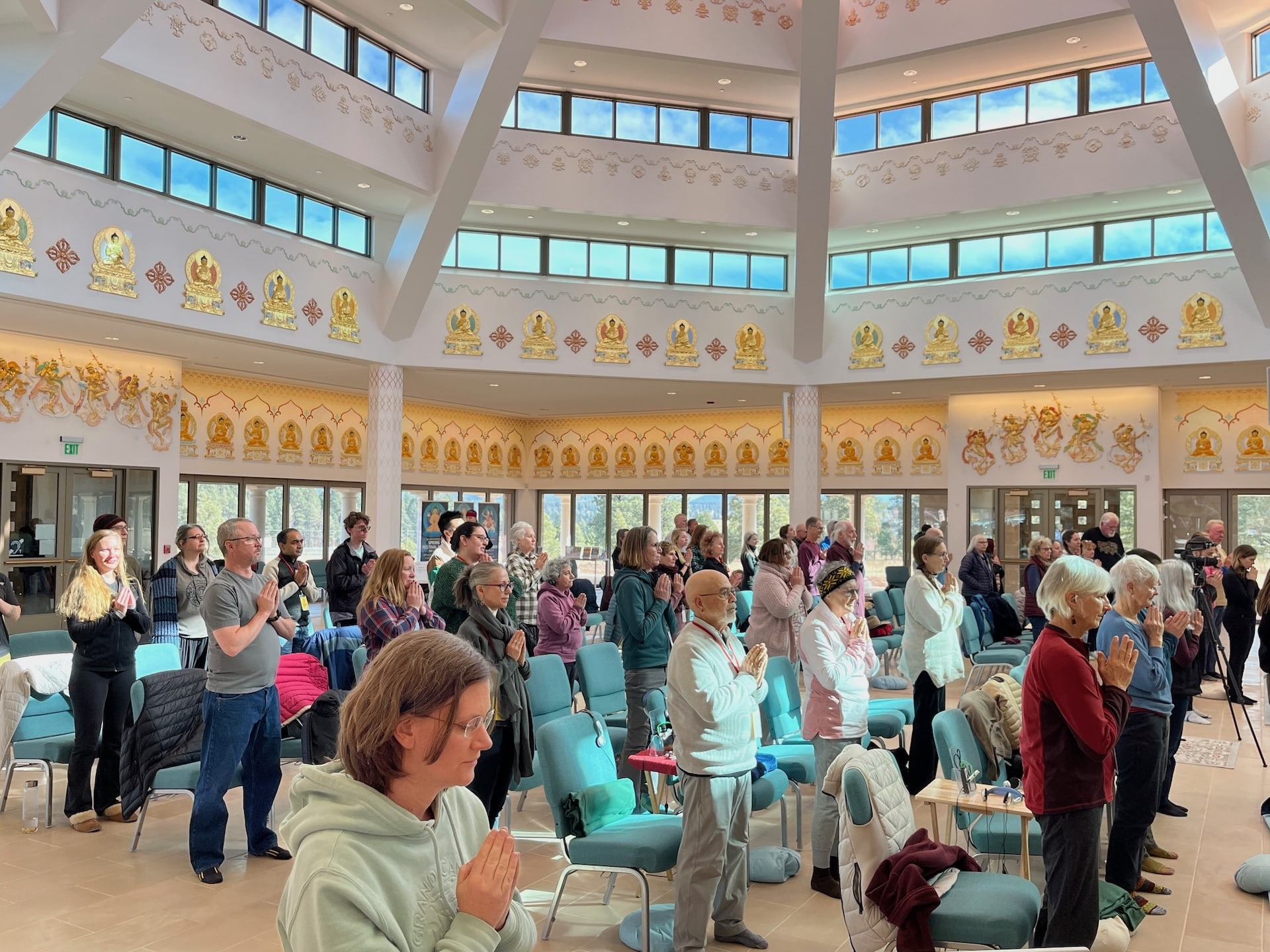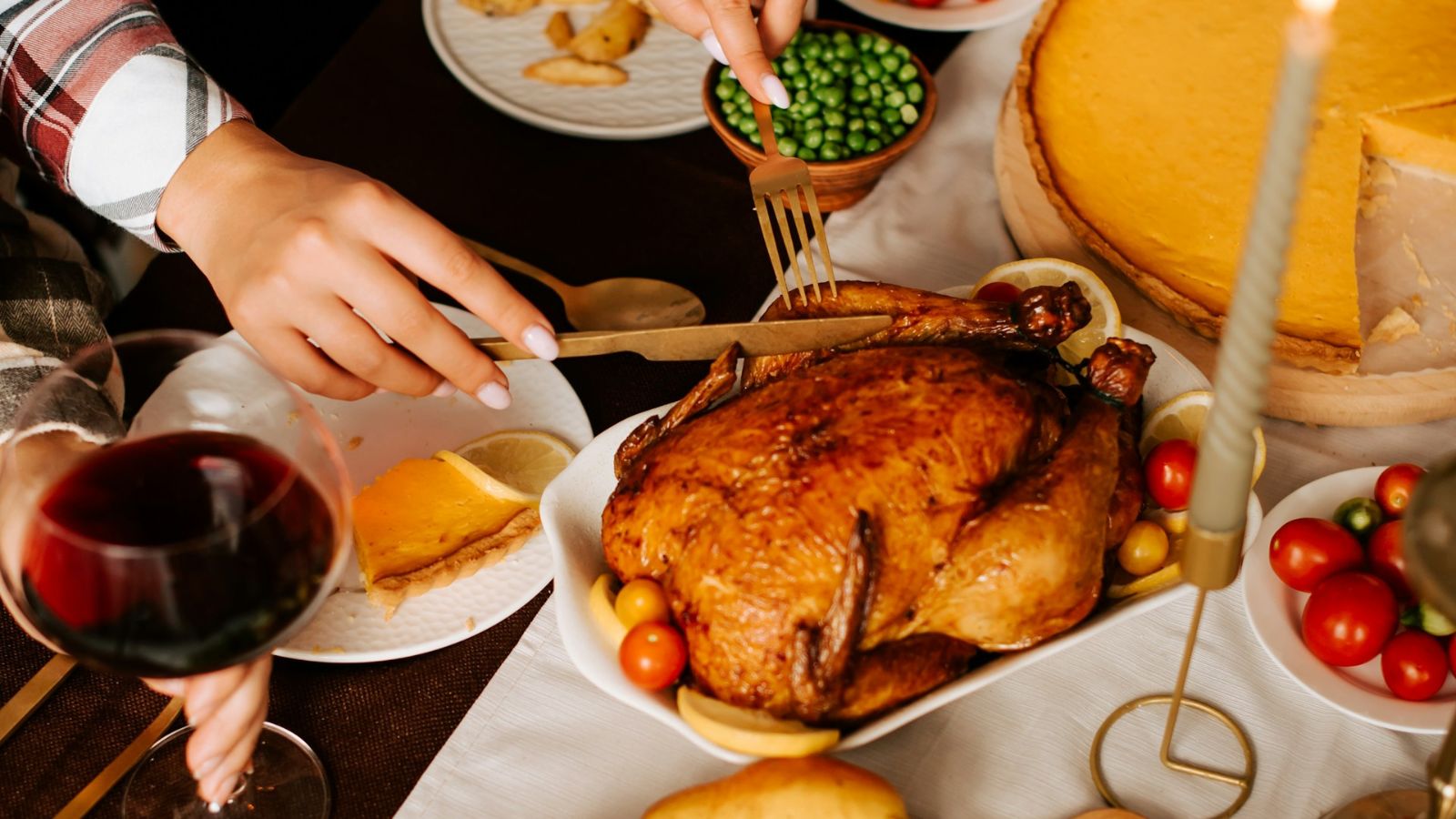Watching Ourselves in ‘The White Lotus’: Season 3
How the HBO series invites us to take a look at our own monkey minds The post Watching Ourselves in ‘The White Lotus’: Season 3 appeared first on Tricycle: The Buddhist Review.

The White Lotus’s third season begins with a literal invitation to mindfulness: A meditation instructor at a Thai hotel tells a new arrival: “Focus on your breathing. Inhale. Exhale.” Wind chimes sound. Gentle breezes flow. “Let us calm our chattering monkey minds. And find in the silence, what is timeless. Breathe in, and slowly breathe out.”
But then gunshots ring out. Windows shatter. Everyone hits the deck.
Showrunner Mike White has built a television empire on the push and pull of this scene’s tones writ large: He implores us toward mindfulness, all while dangling the carrot of juicy intrigue in front of us. Thanks to that, he’s managed to wear his Buddhist influences on his sleeves: The titles of his biggest hits—The White Lotus, Enlightened—explicitly echo core dharma concepts. His characters unironically search for spiritual fulfillment through engagement with temples, monks, and meditation. And yet he’s found a following with Western audiences precisely because these shows never fail to deliver the goods of sex, drama, and violence.
Every season has a similar setup: Someone has been murdered at a luxury hotel chain known as The White Lotus. But who? And why? That, by itself, is enough to get the audience on the hook. But this season, set in Thailand, could keep you watching with its scenery alone. The establishing shots are sublime: mist-swathed palm trees and thirsty swamp hibiscus. The tension of water droplets on lily pads and lotuses. We feel as if we’re in a dream. This is paradise, right?
 Jason Isaacs, Parker Posey, Patrick Schwarzenegger, Sarah Catherine Hook, and Sam Nivola. Photograph by Fabio Lovino/HBO.
Jason Isaacs, Parker Posey, Patrick Schwarzenegger, Sarah Catherine Hook, and Sam Nivola. Photograph by Fabio Lovino/HBO.Unfortunately, then our cast of wealthy guests arrives at the hotel and inevitable distractions set in: They’re frustrated that there’s no Wi-Fi. Or that it’s too hot. Siblings grow annoyed with one another. Petty jealousies arise. Characters lust after other guests. All these people are experiencing real suffering: Divorces. Collapsing careers. Fading looks. Deaths in the family. But rather than engaging with these things directly, they search for ways to numb themselves by clinging to pleasure—drugs, sex, shopping, massages, wellness exams. Anything to forget the pain they carry around.
These are ancient habits of mind. In fact, we’ve seen them play themselves out in almost exactly the same way in past seasons. This manner of showing the predictable karmic nature of human behaviors, season by season, echoes the 11th-century Japanese novel The Tale of Genji, which, bizarrely, kills off its imperial protagonist 800 pages in and then simply shifts its attention to Genji’s nephew and grandson, who have almost exactly the same experiences of disappointment and worldly suffering that their ancestor once did.
Mike White is doing something similar—his preening teens, influencers, and past-their-prime millionaires are the modern courtiers of The White Lotus: the endlessly rotating cast of aristocrats who chase just-out-of-reach pleasures, making the age-old mistake of trying to forget their troubles through aversion. Every season might shift to a new locale or slightly different set of circumstances. But the dramas are largely the same: lust, hatred, greed. Our new group of tourists really might as well be the same as the last ones. That’s the perpetual cycle of samsara at play, an idea hinted at by the premiere episode’s title: “Same Spirits, New Forms.”
The show isn’t didactic about any of this. It understands why its characters fall prey to the seductiveness of their sensory experience, and it gives the viewer what they want: There is drama. So much drama. And gossip. Delicious gossip. And the beautiful actors really are achingly beautiful. And we, as the viewer, are pulled in. Our monkey minds devour the sexual tensions and vitriol and animosity. In this way, the series has its cake and eats it too. Viewers get a prestige drama packed with sex and juicy drama, and Mike White gets a series that is deeply impressed with the philosophical underpinnings of Buddhism.
In fact, you might call this season Monkey Mind: The Series. Macaques are a recurring theme this time around: They peer down from trees that loom over the luxury compound. They laugh like a Greek chorus in the soundtrack. Episodes often end with the camera pulling outward into the monkey-filled forest as the characters stew in the consequences of their own reckless actions.
The cast of suffering tourists is perpetually seeking out that same easy escape from their pain, in wealth, narcotics, sex, quests of vengeance—anything that doesn’t require them to give up their attachments. But, of course, their problems are always there.
Despite this, the show never suggests that any of these characters—no matter how flawed or perverse—live illegitimate lives. And that’s what makes it a particular outlier in an age of broad satire and melodrama. Reformed sex addicts recount their escapades, young women bond over their balding older boyfriends, pampered Westerners search for salvation in temples. All of these could be moments for cheap laughs. Instead, they straddle the line between absurd and transcendent. And that’s the particular trick Mike White pulls: He urges us to see these characters as ridiculous. Then he gives them the depth of human life. Then he makes us see them as ridiculous again. There is no permanent epiphany. We’re always moving into and out of the potential for awakening.
That’s the dual meaning embedded in the show’s title. It references the Buddhist lotus blooming into enlightenment, of course. But it also hints at the Greek myth of the lotus-eaters, in which island dwellers feast on narcotic leaves that make them forget their troubles. The cast of suffering tourists is perpetually seeking out that same easy escape from their pain, in wealth, narcotics, sex, quests of vengeance—anything that doesn’t require them to give up their attachments. But, of course, their problems are always there, peeking out like the monkeys from the trees.
So the show seems to pose the question: Will this lotus we’re referring to harm us or bloom into awakening? And isn’t that the meaning of the Buddhist lotus as well? As it wriggles its way up through the mud of sensory experience—painful and pleasant—we are always exposed to those dual possibilities: We may be caught in attachment, or we may find freedom. It’s the path of enlightenment, either way, which is why we can remind ourselves—as Thich Nhat Hanh did—in traffic, when we are awakened by a garbage truck, when hardship overtakes our life, or even when we’re drawn in by the thrills of a prestige drama: This, too, is an opportunity for practice.
In this way, The White Lotus seems to ask if we, the viewer, can see ourselves in the experience of watching. And how many times will we be tricked by these false impressions before we wake up?
 Natasha Rothwell. Photograph by Fabio Lovino/HBO.
Natasha Rothwell. Photograph by Fabio Lovino/HBO.The season ends with some bloodshed, some mysteries resolved, some airings of grievances, and emotional catharsis. But nothing is resolved. There is no permanent epiphany. All of the old habits will reemerge, either with these characters or with others. In this way, you could just as easily imagine that the finale concludes with this year’s round of characters dissolving and reforming into the cast of The White Lotus: Season 4, stepping out of the mist and humidity at another luxury resort into one more spin around the wheel of samsara.
That, after all, is the shared humanity on display here: We understand each of these characters because their jealousies, their greed, their capacity for violence, their suffering is part of the common lot of human existence. They are our own. We, too, have attempted to escape ourselves through easy release, to forget ourselves in the motion of travel.
We, the viewer, are the lotus-eaters too.

 Koichiko
Koichiko 
































